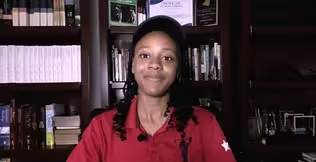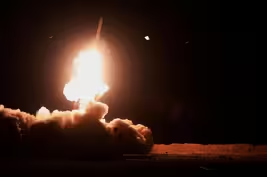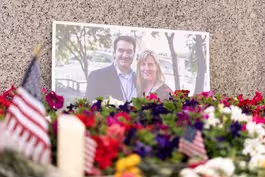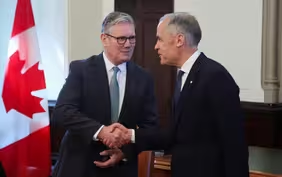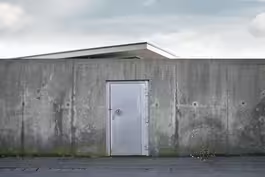
June 15, 2025 - PBS News Weekend full episode
6/15/2025 | 26m 45sVideo has Closed Captions
June 15, 2025 - PBS News Weekend full episode
June 15, 2025 - PBS News Weekend full episode
Problems playing video? | Closed Captioning Feedback
Problems playing video? | Closed Captioning Feedback
Major corporate funding for the PBS News Hour is provided by BDO, BNSF, Consumer Cellular, American Cruise Lines, and Raymond James. Funding for the PBS NewsHour Weekend is provided by...

June 15, 2025 - PBS News Weekend full episode
6/15/2025 | 26m 45sVideo has Closed Captions
June 15, 2025 - PBS News Weekend full episode
Problems playing video? | Closed Captioning Feedback
How to Watch PBS News Hour
PBS News Hour is available to stream on pbs.org and the free PBS App, available on iPhone, Apple TV, Android TV, Android smartphones, Amazon Fire TV, Amazon Fire Tablet, Roku, Samsung Smart TV, and Vizio.
Providing Support for PBS.org
Learn Moreabout PBS online sponsorshipJOHN YANG: Tonight on PBS News Weekend, a massive manhunters underway for the suspect in the assassination of a Minnesota lawmaker and the wounding of another.
Then, Israel and Iran launch new rounds of deadly strikes as the intensifying conflict rages into a third day.
And we meet a teenage rising star in the world of golf who's headed to Australia to compete in an international competition.
GENESIS LEWIS: It's a very strategic game and I really like playing and watching things that requires your brain power when it comes to making decisions.
So the strategic party game is really my favorite part.
(BREAK) JOHN YANG: Good evening.
I'm John Yang.
Once again tonight, we're tracking two big stories in the Middle East.
Israel is broadening its attacks on Iran, but we start in Minnesota, where the hunt goes on for the 57-year-old man who allegedly killed State Representative Melissa Hortman and her husband, Mark.
Police believe the gunman also shot and wounded State Senator John Hoffman and his wife, Yvette.
A family member said both are awake and recovering.
This afternoon, police searched residences in a rural area southwest of Minneapolis after finding the suspect's car there.
Authorities told residents to keep their doors and cars locked.
Senator Amy Klobuchar is the senior senator from Minnesota.
First of all, Senator, I want to tell you how sorry we are that you've lost a colleague and a friend.
I know.
SEN. AMY KLOBUCHAR (D) Minessota: Well, thanks so much, John.
And she's someone that your viewers would have loved to meet.
Many in Minnesota loved her Democrats, Republicans, someone who, you know, starts out as a mom with little kids, running for legislature, door knocking every door in her district and juggles all of it.
Church Sunday school leader, from Girl Scout leader to working her way up the ladder in the legislature and becoming the speaker of the House, a job which she was incredible at.
She would be able to get things done across the aisle, like the budget this year with a tied legislature and then some landmark legislation with the governor, from free school lunch to paid family leave, a very progressive policy.
So she was a leader.
And her grace, her decency is something we're all going to miss.
And for me, just losing a friend like this to violence and political violence makes you realize that this isn't just a statistic.
This isn't just something we talk about at committee hearings.
This happened.
JOHN YANG: You talk about her tenure as speaker this morning I read in the newspaper, a former Republican colleague of hers said that she's indisputably the most consequential, an impactful speaker of the House in Minnesota history.
What made her so effective?
AMY KLOBUCHAR: Yes, you know, I think I started out with the personal only because I think it made her effective.
She was juggling all that stuff, working at her dad's used auto parts store while having these babies and doing all these other things in the community.
And she was able to hold it all together and juggle.
Well, when you're a speaker and you've got members that want all kinds of different things, you've got to be able to do a lot of that.
She also put the mission first.
She knew why she was there.
She was grounded in the community.
I don't think she was someone that was thinking, oh, I want to run for this, I want to run for that.
She just did her job.
And all of that made her loved by the other legislators on both sides of the aisle.
JOHN YANG: The manifesto that was found in the gunman's car had a list of names, including yours.
Do you feel safe?
AMY KLOBUCHAR: You know, we have added security that both Senator Schumer and Senator Thune called me yesterday.
They've been great about it.
But I've got to say, I do feel safe, just because I'm more worried about my constituents out there, because we have at least.
I have no idea where this guy is.
We found a second car today.
Law enforcement did.
People have been following what law enforcement tells them to do because this is a major manhunt, and he is someone that's smart.
One of the most chilling photos is the photo from a doorbell camera right before he killed my friend.
And he had a mask on because he knew it might be picked up by a camera.
So that's why they put that picture out there, as well as pictures of his actual face.
So there is a lot of fear in general around here.
But, yes, I do feel safe.
I will note threats on elected officials have gone from members of Congress, 1,600 in 2016, to over 9,000 last year.
Threats against judges appointed by Democrats and Republicans have escalated greatly.
So this is a very bad environment, and we need to bring the tone down.
And elected officials who are basically throwing fuel onto the fire should be looking in the mirror right now and bring the tone down.
JOHN YANG: Senator, what's the latest you've heard about the condition of the wounded state senator John Hoffman and his wife?
AMY KLOBUCHAR: By the way, also an incredible leader, got into politics as his daughter has spina bifida and wanted to figure out how we can get insurance for kids like that.
So I actually just got a text about an hour ago from his wife because she has come out of surgery and she's doing pretty well by all accounts.
And I just said, you know, call or write me whenever you can.
And she actually wrote me and she said, why don't you share this statement?
So I will share what she just wrote me.
She said, thank you so much, Senator.
Our family is so humbled by the love and outpouring we've received from everyone.
John is enduring many surgeries right now and is closer every hour to being out of the woods.
He took nine bullet hits.
I took eight.
And we are both incredibly lucky to be alive.
We are gutted and devastated by the loss of Melissa and Mark.
We have no words.
There is never a place for this kind of political hate.
Thank you for your friendship.
Minnesotans are at our very best when we stand together.
JOHN YANG: Thank you, Senator.
We wish the Hoffmans the best.
And we also extend our condolences to you once again.
And thank you for joining us.
AMY KLOBUCHAR: All right.
Great to be on.
Thank you.
JOHN YANG: And now to the Middle East, where Israel and Iran exchanged airstrikes and missile barrages for a third straight day.
Israel struck at least two oil refineries as it widens its target list beyond military and nuclear facilities.
In addition, Israel warned Iran to evacuate arms factories.
A human rights group that's long tracked Iran says Israel's strikes have killed at least 406 people and wounded another 654.
In response, Iran launched more missiles into Israel.
Outside Tel Aviv early this morning, rescue teams searched for survivors in the rubble of an apartment building.
At least 10 people in Israel have been killed overnight, bringing the death toll there to 13.
Josef Federman is the Associated Press news director for Israel, Jordan and the Palestinian territories.
Joe, what's the latest on what's going on the ground in Israel right now?
JOSEF FEDERMAN, The Associated Press: Well, this military operation is continuing.
Israel is continuing to strike targets in Iran.
So that means that we are seeing repeated barrages of missile fire.
In fact, just over an hour ago, we had another missile attack.
Nothing landed here in Jerusalem.
This time the missiles fell in northern Israel.
But these alerts are affecting the entire country.
Oftentimes we can look up in the sky and you can see interceptions and things flying overhead.
So, you know, we're seeing it across the country and feeling it everywhere.
JOHN YANG: And this is all -- this is nationwide.
This isn't concentrated in a particular part of the nation.
JOSEF FEDERMAN: No, the alerts are going off across the country.
We have gone through three drills in the past 24 hours where the landings have been across the country.
We've seen them in the Tel Aviv area in northern Israel and even south of Tel Aviv as well.
Nothing so far has landed in Jerusalem, but you do feel it.
You see interceptions overhead, and you hear the thunder, the booming, almost sort of like a bass drum or thunder off in the distance because everything is relatively close here.
JOHN YANG: Help us understand what it's like to live with this threat looming over you.
JOSEF FEDERMAN: It's very disruptive.
You can feel it really everywhere you go.
The other night I was on the first night of the fighting, I was driving home from the office, and it reminded me of those early days of COVID.
The roads were just completely empty.
Maybe you would see a taxi here and there, but really empty things have come alive just a little bit.
But the volume -- the number of people you see on the streets is minimal.
Many of the stores are closed or closing early.
Schools are only learning over Zoom right now.
So it's really disrupted life across the country.
It affects people's moods.
People are tense, they're worried, and they don't know where this is headed.
JOHN YANG: You know, over the past 25 years, Israelis have dealt with suicide bombers, rockets coming from Lebanon, rockets coming from Gaza.
I'm wondering, do you have a sense of how people are reacting in comparison, how it compares to those other things?
JOSEF FEDERMAN: It's always hard to compare.
Each one is unique.
Each one has its own sets of challenges.
This one is quite scary just because the types of weapons that are being fired here.
These missiles are huge.
The prime minister has compared them to sort of flying buses, and they are sending barrages of dozens of them at the same time.
What makes this conflict different compared to the other ones that you mentioned is that Israel does have that air defense system.
You probably heard about Iron Dome and other systems that they use to intercept these missiles.
So that does give you some sense of personal security.
But the system isn't 100 percent.
And when dozens and dozens of these missiles are coming, it's almost inevitable that something's going to get through.
And just that feeling that it's so random, you don't know where it's going to come down.
You don't know if you're 100 percent safe.
So this time around is quite chilling, just like all the other ones.
JOHN YANG: This is, of course, on top of almost a year and a half now of war in Gaza.
What's the public sentiment about this?
JOSEF FEDERMAN: Well, after a year and a half of conflict in Gaza, the country's become very divided over that.
There's a large number of people who just want to see that war end.
And you probably know there are hostages who remain inside Gaza.
They want to see those hostages come home.
But so far, the public I haven't seen opinion polls yet.
We're only a few days into this, but the public does seem to be lining up behind this one.
Israel's opposition leader Yair Lapid also has come out in favor.
There's really a widespread consensus.
Iran is seen as the biggest threat, the biggest enemy to Israel.
And that feeling is pretty widespread.
So early on, at least the public seems to behind this.
But we've seen this many times before.
Operations start off kind of clean with lots of support.
The longer they drag on, the more things can get messy and the more the nation can become divided.
JOHN YANG: Josef Federman of The Associated Press in Jerusalem, thank you very much and stay safe.
JOSEF FEDERMAN: Thank you.
JOHN YANG: The Israeli Iranian conflict is likely to be a topic for world leaders at the G7 summit in the Canadian Rockies.
They're expected to issue a joint statement calling for both sides to deescalate.
The summit, which begins Monday, brings together the heads of the world's largest economies to discuss international security and global economic stability.
So President Trump's tariffs are likely to be discussed.
The U.S. has levied tariffs on all of the other nations in the G7.
Ukraine's president claimed a victory in his nation's war against Russia, President Volodymyr Zelenskyy said.
Ukrainian forces recaptured a village in the Sumy region on the border with Russia.
Zelenskyy said the mission is part of an effort to repel Russian forces from the area, which has seen heavy fighting.
Organizers of the "No Kings" protest said millions of demonstrators attended more than a thousand events nationwide.
The Saturday protests were mostly peaceful in places stretching from San Francisco to Austin, from Boston to Puerto Rico.
Demonstrators marched in support of LGBTQ rights and against the Trump administration's deportation drive.
In Los Angeles, demonstrations began peacefully, with thousands marching through downtown.
But tear gas canisters were fired when mounted patrols tried to break up crowds that police said were trying to damage federal buildings.
As those protests were going on in Washington, D.C., the military parade celebrating the Army's 250th birthday was went on as planned.
Tanks rolled down streets, the Golden Knights parachuted in from the skies, and thousands of soldiers marched in historic uniforms to show the evolution of the American soldier.
President Trump's arrival at the parade was accompanied by celebratory cannon fire.
Later, he administered the oath to soldiers re enlisting.
In his remarks, Mr. Trump heaped praise on the army.
DONALD TRUMP, U.S. President: Down through history, we've been blessed beyond words by this valiant legion of army warriors and patriots, heroes and legends.
And tonight we affirm with unwavering certainty that in the years ahead and in every generation hence, whenever duty calls and whatever danger comes, the American soldier will be there.
JOHN YANG: Estimates of the parade's cost range between $25 million and $45 million.
It also happened to be Mr. Trump's 79th birthday.
Still to come on PBS News Weekend, how Americans are fortifying their homes to prepare for the worst.
And we meet a new rising star in the world of golf.
(BREAK) JOHN YANG: Bomb shelters, secret passageways, gun rooms and flammable moats may sound like the stuff of Hollywood.
But across the country, there are parts of some people's plans to protect themselves against the worst.
That's according to a recent New York Times Magazine report that chronicles the rise of the booming panic industry.
Eli Rogin spoke with Coralie Kraft, contributing photo editor for the New York Times Magazine.
ALI ROGIN: Coralie, thank you so much for joining us.
What's behind the rise in people wanting to prep for some sort of doomsday scenario?
CORALIE KRAFT, Writer and Photo Editor, The New York Times: So the people that I spoke with said that there was a huge surge in business post-pandemic and also in the lead up and aftermath of the recent election.
I would say that many of the people who are interested installing these types of hidden gun ranges and panic rooms and things like that in their homes, many of them said that they were afraid of things like another pandemic, financial collapse or, you know, even nuclear war.
ALI ROGIN: And the notion of prepping has been a fascination on the pop culture scene for a number of years now.
How do you describe this kind of mainstreaming of the panic industry and of preparing in this way?
CORALIE KRAFT: I think that as more and more people are impacted by things like pandemics, by civil unrest and, you know, demonstrations and activism in their cities, by financial collapse as those factors hit a wider and wider population, it makes sense to me that more of us would be interested in this type of, you know, what can I do in the event of a disaster scenario or a doomsday scenario.
ALI ROGIN: People in the middle class you report on are becoming more interested in this.
These companies are getting more calls from people who don't have millions of dollars, but they do want to invest in some ways, as they see it, to protect themselves.
CAROLIE KRAFT: That's completely right.
Yeah.
So, you know, there are bunkers that are prefab and might cost someone $20,000 instead of 100,000 or 10 million.
One of the people that I spoke with said something like, the bunkers that I'm selling are for people who have $20,000 to spend, not $200,000.
They make $60,000 and drive a Chevy pickup truck.
They don't drive a Ferrari.
They don't drive, you know, fancy cars and things like that.
ALI ROGIN: What do we know about any correlation between the amount of money you have to spend one of these things and your chances at actually surviving some sort of cataclysmic event?
CAROLIE KRAFT: After speaking with several people who are in this industry, I think that there are certainly some clients who are thinking very actively about exactly how they will survive.
You know, the event, they call it the doomsday event.
I think that also a lot of them are living in the anxiety of the now rather than the reality of the future, if that makes sense.
ALI ROGIN: It does.
That's really interesting, but you've seen some very extravagant lengths that people are going to.
I know you are limited in what you can disclose about some of them, but describe what you saw on the higher end of this industry.
CORALIE KRAFT: There's a location that I cannot reveal, but it is in the upper Midwestern United States where an individual and his family have decided to build a compound for themselves that is a fortified home surrounded by a moat.
And that moat can be lit on fire at will by the homeowner.
There are cannons on the property that will distribute a flammable liquid across the surface of the moat.
There is also a tunnel leading to the property that essentially functions as a giant microwave.
And it could heat up and, in theory, stop any unwanted intruders.
ALI ROGIN: Are there any ideological similarities that you picked up among the people investing in these measures that would indicate, you know, a similar school of thought on the animating issues that they're talking about, like climate change, like the economy, like civil unrest.
CORALIE KRAFT: I would say that the commonality is that they're all driven by a very strong need for peace of mind.
There are certainly people who did say that climate change is a concern, but when it comes to thinking about climate change, it's not necessarily that they are someone who believes in climate change as a holistic concept.
It's more that they have noticed that there are more tornadoes in their areas or more extreme weather.
And, you know, I think that financial collapse, certainly, especially for some of the wealthier clients, that is something that is very top of mind for them.
And the pandemic, as I said, really impacted people of all income levels.
The commonality of that experience is something that is broadening the market, I would say, and kind of leading at least in part to a surge in business within this industry.
ALI ROGIN: Coralie Kraft with the New York Times.
What a fascinating story.
Thank you so much.
CORALIE KRAFT: Thank you so much for having me.
JOHN YANG: Finally tonight, most high schoolers spend their summer vacations hanging out with friends, but not Genesis Lewis.
She's spending hers gearing up for an international golf competition.
The North Carolina Rising senior will be on a U.S.
Junior golf team selected by Coast To Coast International Athletics to compete in an upcoming tournament in Australia.
She's taking a break from the driving range to join us now.
Genesis, how long have you been playing golf?
GENESIS LEWIS: I've been playing since I was 4 and started competing at 7, so probably about 10 years now.
JOHN YANG: How did you get started?
GENESIS LEWIS: My dad would take me to the golf course when he goes to the driving range and I would just admire how he swing his golf club, which brought me more into the game as well.
JOHN YANG: And what is it about golf that you like?
What appeals to you about it?
GENESIS LEWIS: It's a very strategic game and I really like playing and watching things that requires your brain power when it comes to making decisions or trying to discover something.
So the strategic party game is really my favorite part.
JOHN YANG: In the history of the LPGA, there have only been eight black members.
I wonder what it's been like growing up playing this game and not seeing a lot of players who look like you.
GENESIS LEWIS: It was very tricky because when I was younger, I would try to make friends on a golf course and like a lot of them didn't really try to be friends with me.
They'd be friends with each other.
Especially when I start getting better at the game and start improving more, they kind of distance themselves away from me.
So that was a big drawback for me.
But as I got older, I realized that no matter what, you got focused on yourself.
And I got to a point where I almost put my clubs down and just play for fun.
But then my dad let me join the Twigs Golf association, which is where they encourage other black young women into golf.
Help them out, give them that sisterhood.
And along with that, seeing more black individuals like ourselves on the golf course.
JOHN YANG: Twigs is a triangle women in golf.
You live in the Research Triangle in North Carolina.
Talk a little bit more about what you got from the group and what you got from the other members in the group.
GENESIS LEWIS: I got networking skills.
Not only that, meeting other mentors.
They also have us big sisters to help out, younger sisters, which are the younger kids helping help out with golf, being that older sister that they probably never have.
And along with that, we also started learning some new other golf skills that help us enhance our game.
JOHN YANG: So you now mentoring young people, sort of passing along what you got from the other members when you were younger?
GENESIS LEWIS: Yes, I've been mentoring one girl for the past two years now.
JOHN YANG: And talk about that.
Is it rewarding?
Does it make you feel good?
GENESIS LEWIS: It makes me feel good.
But I also see myself in her as well, because some of the things she may not experience the same things that I went through, but because I've been through so much, I know where to stop and where I do not want her to experience the same things that I experience.
So I'm kind of like oversighting her, not only with golf, but also as a person.
So that gives me feel like I'm an older sibling because I'm an only child.
JOHN YANG: Now, I know you're headed off to Australia for a tournament.
Tell us about that.
GENESIS LEWIS: Yes.
So on July 5, I will be flying to Australia, and I'll be staying there for about two weeks.
And we will be practicing as a team, as a collective, among other individuals who have been picked to play on the junior team as well.
JOHN YANG: This isn't your first time playing in Australia, is that right?
GENESIS LEWIS: Yes, sir.
My first time playing Australia is when I win the Champion Tour when I was in third grade at the age of eight and I competed in Australia because I won the tour champion.
JOHN YANG: What's ahead for you?
Do you want to play golf?
I know you're on the high school team.
Would you like to play golf in college?
GENESIS LEWIS: Yes, sir.
I like to play golf in college.
Along with that, when I become an LPGA golfer.
JOHN YANG: I've seen your name on some recruiting webpages, so I was wondering if colleges are talking to you.
GENESIS LEWIS: Yes, sir.
Colleges are still talking to me.
And I haven't made my final decision yet, but I'm still looking.
JOHN YANG: Well, good luck with that.
Good luck in Australia and Genesis thank you so much for your time.
GENESIS LEWIS: Thank you for having me.
JOHN YANG: And that is PBS News Weekend for this Sunday.
I'm John Yang.
For all of my colleagues, thanks for joining us.
Happy Father's Day and have a good week.
How teenage rising golf star Genesis Lewis got into the game
Video has Closed Captions
Clip: 6/15/2025 | 4m 23s | How teenage rising golf star Genesis Lewis got into the game (4m 23s)
Israel and Iran launch deadly strikes for third straight day
Video has Closed Captions
Clip: 6/15/2025 | 5m 2s | Israel and Iran launch new round of strikes as deadly conflict rages into third day (5m 2s)
Klobuchar reflects on legacy of slain Minnesota lawmaker
Video has Closed Captions
Clip: 6/15/2025 | 5m 54s | Minnesota Sen. Klobuchar reflects on legacy of slain state lawmaker (5m 54s)
News Wrap: World leaders arrive in Canada for G7 summit
Video has Closed Captions
Clip: 6/15/2025 | 2m 48s | News Wrap: World leaders arrive in Canada for G7 summit (2m 48s)
‘Panic industry’ booms as more Americans fortify their homes
Video has Closed Captions
Clip: 6/15/2025 | 5m 25s | ‘Panic industry’ surges as more Americans fortify their homes to prepare for the worst (5m 25s)
Providing Support for PBS.org
Learn Moreabout PBS online sponsorshipSupport for PBS provided by:
Major corporate funding for the PBS News Hour is provided by BDO, BNSF, Consumer Cellular, American Cruise Lines, and Raymond James. Funding for the PBS NewsHour Weekend is provided by...
